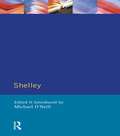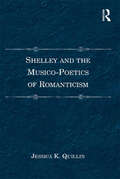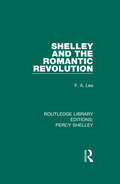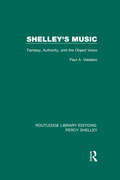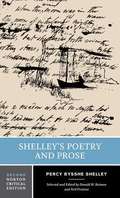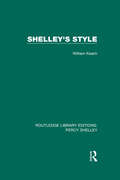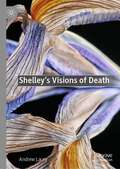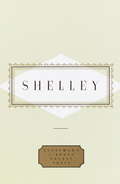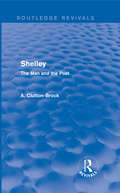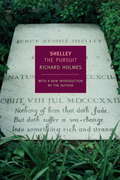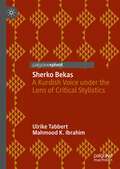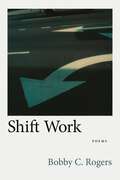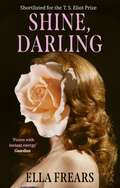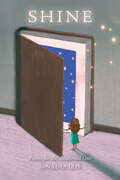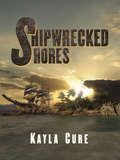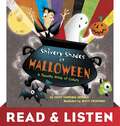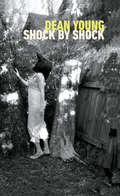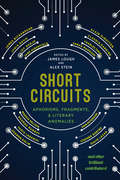- Table View
- List View
Shelley (Longman Critical Readers)
by Michael O'NeillAttacked by T.S. Eliot and F.R. Leavis, Shelley's poetry has, over the last few decades, enjoyed a revival of critical interest. His radical politics and arrestingly original poetic strategies have been studied from a variety of perspectives - formalist, deconstructionist, new historicist, feminist and others. Of all the Romantics, Shelly has benefited most from the so-called 'theoretical revolution', as is borne out by the wide range of recent critical work represented in this volume. The 134 essays selected analyse many of Shelley's finest poems, including Alastor, Julian and Maddalo, Prometheus Unbound, Adonais and The Triumph of Life. Michael O'Neill's informed Introduction explores the contours of this debate. Detailed headnotes to the individual essays, explanations of difficult terms, and a further reading section provide invaluable guides to the reader. This collection illuminates the enduring and contemporary significance of the work of a major poet.
Shelley and the Apprehension of Life
by Ross WilsonPercy Bysshe Shelley, in the essay 'On Life' (1819), stated 'We live on, and in living we lose the apprehension of life'. Ross Wilson uses this statement as a starting point to explore Shelley's fundamental beliefs about life and the significance of poetry. Drawing on a wide range of Shelley's own writing and on philosophical thinking from Plato to the present, this book offers a timely intervention in the debate about what Romantic poets understood by 'life'. For Shelley, it demonstrates poetry is emphatically 'living melody', which stands in resolute contrast to a world in which life does not live. Wilson argues that Shelley's concern with the opposition between 'living' and 'the apprehension of life' is fundamental to his work and lies at the heart of Romantic-era thought.
Shelley and the Musico-Poetics of Romanticism
by Jessica K. QuillinAddressing a gap in Shelley studies, Jessica K. Quillin explores the poet's lifelong interest in music. Quillin connects the trope of music with Shelley's larger formal aesthetic, political, and philosophical concerns, showing that music offers a new critical lens through which to view such familiar Shelleyan concerns as the status of the poetic, figural language, and the philosophical problem posed by idealism versus skepticism. Quillin's book uncovers the implications of Shelley's use of music by means of four musico-poetic concerns: the inherently interdisciplinary nature of musical imagery and figurative language; the rhythmic and sonoric dimensions of poetry; the extension of poetry into the performative realms of the theatre and drawing room through close links between most poetic genres and music; and the transformation of poetry into music through the setting and adaptation of poetic lyrics to music. Ultimately, Quillin argues, Shelley exhibits a fundamental recognition of an interdependence between music and poetry which is expressed in the form and content of his highly sonorous works. Equating music with love allows him to create a radical model in which poetry is the highest form of imaginative expression, one that can affect the mind and the senses at once and potentially bring about the perfectibility of mankind through a unique mode of visionary experience.
Shelley and the Romantic Revolution (RLE: Percy Shelley #3)
by F.A. LeaFirst published in 1945. In this work the author seeks to correct the misinterpretation and incorrect labelling of Shelley’s thought. While not neglecting Shelley as a poet, this book focuses on his contributions made to the general movement of political and philosophical thought of his era and by so doing his relevance to contemporary issues. This title will be of interest to students of literature.
Shelley's Music: Fantasy, Authority and the Object Voice (RLE: Percy Shelley #4)
by Paul A. VatalaroFirst published in 2009. This book argues that the images of and allusions to music in Shelley’s writing demonstrate his attempt to infuse the traditionally masculine word with the traditionally feminine voice and music. This further extends to his even more fundamental desire to integrate the "object voice" with his own subjectivity. For Shelley, what plagues this integration is the prospect of losing both the poet’s authority and the subjectivity upon which it relies. This book asserts that the resultant deadlock and instability paradoxically becomes Shelley’s ultimate goal — creating a steady state of suspension that finally preserves both his authority and his humanity.
Shelley's Poetry And Prose, 2nd Edition
by Percy Bysshe Shelley Neil Fraistat Donald H. ReimanEach selection has been thoroughly reedited, and the order of the poems has been rearranged in light of redating or other reconsiderations. All headnotes are new or updated, and many footnotes have been added, replaced, or revised. "Criticism" reflects the recent renaissance in Shelley studies, the greatest renaissance since 1870-92. All twenty-three essays are new to the Second Edition; among them are the work of Harold Bloom, Stuart Curran, Annette Wheeler Cafarelli, Michael Ferber, James Chandler, and Susan J. Wolfson. A Chronology, an updated Selected Bibliography, and an Index of Titles and First Lines are included.
Shelley's Style (RLE: Percy Shelley)
by William KeachFirst published 1984. In a provocative study, this book argues that the problems posed by Shelley’s notoriously difficult style must be understood in relation to his ambivalence towards language itself as an artistic medium — the tension between the potential of language to mirror emotional experience and the recognition of it’s inevitable limitations. Through an exposition of Shelley’s idea of language, as reflected in his theoretical writings and individual poems, this book makes a strong case for his artistic worth. A definitive introduction to Shelley, useful for both scholars and newcomers, this book will be interest to students of literature.
Shelley's Visions of Death
by Andrew LaceyThis book provides the first modern, in-depth analysis of Percy Bysshe Shelley’s engagement with the phenomenon of death. It argues that, for Shelley, this most nebulous of realities represents, first and foremost, possibility: Shelley’s poetic writings on death are both numerous and varied, presenting his reader, with differing degrees of confidence over the course of his brief but brilliant career, with several key visions of what death might be or actually is. Shelley’s Visions of Death stresses the seldom-appreciated fact that death was one of Shelley’s most enduring preoccupations, and also demonstrates the poet’s power to imagine, with startling variety, that which lies beyond the boundaries of experience.
Shelley's Visual Imagination
by Nancy Moore GosleeShelley's drafts and notebooks, which have recently been published for the first time, are very revealing about the creative processes behind his poems, and show – through illustrations and doodles – an unexpectedly vivid visual imagination which contributed greatly to the effect of his poetry. Shelley's Visual Imagination analyzes both verbal script and visual sketches in his manuscripts to interpret the lively personifications of concepts such as 'Liberty', 'Anarchy', or 'Life' in his completed poems. Challenging the persistent assumption that Shelley's poetry in particular, and Romantic poetry more generally, reject the visual for expressive voice or music, this first full-length study of the drafts and notebooks combines criticism with a focus upon bibliographic codes and iconic pages. The product of years of close examination of these remarkable texts, this much-anticipated book will be of great value for all students of Shelley and all those interested in the Romantic process of creation.
Shelley: Poems
by Percy Bysshe ShelleyPercy Bysshe Shelley (1792-1822) was perhaps the most intellectually adventurous of the great Romantic poets. A classicist, a headlong visionary, a social radical, and a poet of serene artistry with a lyric touch second to none, Shelley personified the richly various--and contradictory--energies of his time. This compact yet comprehensive collection showcases all the extraordinary facets of Shelley's art. From his most famous lyrical poems ("Ozymandias," "The Cloud") to his political and philosophical works ("The Mask of Anarchy," "Hymn to Intellectual Beauty") to excerpts from his remarkable dramatic and narrative verses ("Alastor," "Prometheus Unbound"), Shelley's words gave voice to English romanticism's deepest aspirations.
Shelley: The Man and the Poet (Routledge Revivals)
by A. Clutton-BrockFirst published in 1909, with a second edition in 1923, this concise and easily accessible overview of Shelley’s life and work presents the poet not as popular legend would have it, but in a more objective light. A.Clutton-Brock notes his forthright and imperious attitude to life – a life in which Shelley found himself increasingly unhappy – and critically examines many facets of his artistic career which are often overlooked or misrepresented.
Shelley: The Pursuit
by Richard HolmesShelley: The Pursuit is a most apt title as this is indeed a biography that goes on the chase to bring together all manner of opinions; both contemporary and historical to weave together the short chaotic life of the poet Percy Bysshe Shelley.
Shelter
by Carey SalernoDisturbing because of the cruelty intended as kindness to animals and the speaker's unflinching, relentless insistence on her culpability, these poems force us to consider whether we can be redeemed by our capacity for love, compassion, and personal responsibility.
Sherko Bekas: A Kurdish Voice under the Lens of Critical Stylistics
by Ulrike Tabbert Mahmood K. IbrahimThis book explores poetry by Sherko Bekas, a Kurdish writer and Swedish Tucholsky award winner, providing contextualising biography (with original new information from an interview with his son) and critical stylistic analyses of two selected poems. The authors also include a section on the Kurdish language and translation of the poems into English. There are very few English translations of some of Bekas' poems and no book so far on the stylistic or even linguistic analysis of his work, with the result that Bekas is not widely known in the "Western" world. This book aims to fill this lacuna in the literary and linguistic canon, and it will be of interest to students and scholars of Translation, Stylistics, Middle Eastern History and Literature.
Shibboleth
by Michael DonaghyThis is Michael Donaghy's first full-length collection of verse to be published. His work has a wit and grace reminiscent of the metaphysical poets,and his subjects range widely, responding in unexpected ways to his curiosity and inventiveness. Among the varied pieces collected here are a number of love poems remarkable for their blend of tenderness and irony; a terse 'news item'; playful 'translations' of a mythical Welsh poet; and an 'interview' with Marcel Duchamp. As the American poet and critic Alfred Corn says: 'Michael Donaghy's poems have the fine-tuned precision of a ten-speed bike, the wit of a streetwise don, a polyphonic inventiveness ... Poems so original, wry, and philosophical as these are hard to come by. Don't think of passing them up.' Michael Donaghy was born in 1954 in the USA. For several years he was poetry editor of the Chicago Review, before he moved to England. He now lives in north London, where he also plays with a group of traditional Irish musicians.
Shift Work: Poems (Southern Messenger Poets)
by Bobby C. RogersShift Work gathers a chorus from the storytelling working classes of the Upper South. In narrative poems made of sinewy, Whitmanesque lines, Bobby C. Rogers composes portraits of dwellers in the small towns, unincorporated communities, and hard-edged cities they have flown to, always packing their past with them, an inheritance as ephemeral as vapor, made mostly of memory even as it was being lived.
Shine, Darling
by Ella FrearsA Poetry Book Society Recommendation Shortlisted for the Forward Prize for Best First Collection Shortlisted for the T. S. Eliot Prize for PoetryUpdated edition, with a new poem and a new essay by Ella, on poetry and process'Fizzing with insistent energy . . . full of crystalline images and metaphors . . . Frears is excellent on sexual politics, the end of girlhood' Guardian Ella Frears's debut is a collection of wry, vivid poems whose power lies in their intimacy. They are as insistent as they are circumspect, drawing close to the reader's ear and bringing them into confidence. The engine of Shine, Darling is one of strength, of fortitude in confronting and surviving the world, of a lifted-chin audacity - 'There was pain,' the speaker allows, 'but it was not new pain.' Frears's work is world-weathered rather than world-weary, delighted by service stations, fucking on bins in Cornwall, in constant communion with the moon. It lives for the power-play of people, of the pull of the sea, the smoky air - 'Stormy, sticky with flies' - and tangled underbrush where the land ends. Her characters test each other, experimenting with the boundaries of physical violence, of punishment, of traps, all the while drawing the reader into a complicity that gives these poems all their daring, electrifying muscularity. In Shine, Darling, the desire to expose and disclose wrestles with defence and defiance. The result is exhilarating, a 'glorious full-bodied' debut collection with the draw of an adamant tide.
Shine: Poems for the Awakened One
by Nadia IrisEver wondered about the mystery of creation? Do you often feel like there’s more to life than what you’ve been told? There is! Dive deep into the magical stories of love, adversity and adventure. Join the journey of a Sun named Shine as he asks the Very First Question and is presented with a peculiar answer. Follow along with the adventure of a Magician and a Fairy Queen who intend to save their town by reminding the King that love is stronger than fear. Transform with a Secret Keeper who must decide if keeping secrets is his True Purpose and learn, ponder and explore universal concepts such as the Law of Attraction, the Chakras, the Star Signs, Intuition and the Elements as you discover things you didn’t know you knew! Every single person on the planet has within themselves a unique gift, something valuable and priceless to share with the world. Let these poems remind you of what lies dormant within your heart. Be brave enough to accept your light and let…it…SHINE. Something magical happens when you let your heart lead the way.
Ship
by Chris DemarestShip sails, tug beside. Salt air. Early tide.Take a voyage on the high seas in this rhyming book from Chris Demarest. Perfect for little ones ready to set sail. Check out Demarest's other transportation books, Bus, Plane, and Train, for more on-the-go charm!
Shipwrecked Shores
by Kayla CureShipwrecked Shores by Kayla Cure is filled with poetry and short stories about pain, heartbreak, beauty, and letting go. It's about the shipwreck that takes you to prettier shores. Sometimes, you have to break to find out what you're made of, and if you're lucky, you might just find yourself amongst the wreckage.
Shiver Me Letters: A Pirate ABC
by June SobelHaving decided that R is not enough for them, a bumbling band of pirates sets sail on a quest to capture the rest of the alphabet. R-r-r-run for your lives, all ye alphabet letters! Ages 2 to 5
Shivery Shades of Halloween: Read & Listen Edition
by Mary McKenna SiddalsA rollicking, rhyming Halloween romp—in every color! What color is Halloween? Why, it&’s as green as an &“eerie glow, evil grin, vile brew, clammy skin,&” as white as &“cobwebs clinging, a misty trail, a skull, a spook, a face gone pale . . .&” Children will learn their colors as they follow a cute little creature on his adventure through haunted halls, moonlit forests . . . perhaps even a Halloween party! Jimmy Pickering&’s stylized settings and adorable monsters add a blast of colorful creepy-crawliness that will make kids giggle. Who knew that learning colors could be such spooky fun?This Read & Listen edition contains audio narration.
Shock by Shock
by Dean Young"Dean Young challenges the reader to hang on as he jigs from one poetic style to another and sets a wondrous course across a Duchampian landscape."--Chicago Tribune"In Young's work, the big essential questions--mortality, identity, the meaning of life--aren't simply food for thought; they're grounds for entertainment."--The Sunday Star (Toronto)Dean Young escorts his transplanted heart into invigorating poetic territory that combines the joy of being alive with his signature mixture of surrealism, humor, and fast-cut imagery. A Pulitzer finalist known for his hard-won insights, NPR said it best when they observed that Young sees "even in the smallest things the heights of what we can be."From "Harvest":Bring me the high heart of a trapezist.If not, bring me the heart of a drunk monkso I may illuminate an ancient textin a language I can't understand.The brain too is blood, blood racing100 miles an hour on training wheelsso let me splash through a red puddle,let me kiss the face of a red puddle,let me write my crazed, extreme demandson the frost-cracked window of god's splitchest... Dean Young is the author of twelve books of poetry, including finalists for the Pulitzer Prize and Griffin Award. He teaches at the University of Texas and lives in Austin.
Short Circuits: Aphorisms, Fragments, and Literary Anomalies
by James Lough Alex SteinFollowing up on the success of their first anthology of aphorisms, Short Flights, editors James Lough and Alex Stein have returned with a new volume that expands on the theme of aphorisms to include other short form writing and concrete poetry and prose from several of the world's leading, award-winning, and bestsellling writers in the genre, including Charles Simic, Lydia Davis, Sarah Manguso, Jane Hirschfield, Joy Harjo, Yahia Labadidi, Claudia Rankine, and Stephen Dobyns.
